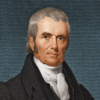John Marshall

John Marshall
John Marshallwas the fourth Chief Justice of the Supreme Court of the United States. His court opinions helped lay the basis for United States constitutional law and many say made the Supreme Court of the United States a coequal branch of government along with the legislative and executive branches. Previously, Marshall had been a leader of the Federalist Party in Virginia and served in the United States House of Representatives from 1799 to 1800. He was Secretary of State under...
NationalityAmerican
ProfessionJudge
Date of Birth24 September 1755
CountryUnited States of America
And we do ask a lot of our middle linebacker.
During intervals of humanity, some disposition has been manifested to permit the return of those who have never offended, who have been banished by a terror which the government itself has reprobated, & to permit in case of arrestation, an investigation of the fact of emigration as well as of the identity of the person accus'd.
The water would lay on the inside of the track. The drainage system will take care of that.
The very essence of civil liberty certainly consists in the right of every individual to claim the protection of the laws, whenever he receives an injury. One of the first duties of government is to afford that protection.
It would be useful to the voters if Marc wanted to talk about the issues, but he's now proven he's incapable of civil debate. He's more interested in calling names. Holtzman is desperate for attention.
That track will be able to accommodate the horsemen. There are training needs and more horseman needs than we can provide at times. So that will be available.
We're looking to see who the guys are that are going to step up and take some more shots on goal.
Paris presents one incessant round of amusement & dissipation but very little, I believe - even for its inhabitants of that society - which interests the heart. Every day, you may see something new, magnificent & beautiful; every night, you may see a spectacle which astonishes & enchants the imagination.
I'm on the phone with Ray all the time. Ray is anxious as heck, but he's got to take care of himself.
It's a little bit of a bellwether for the Western Slope.
They want to be good. They want to work at it. If you just mention, 'You guys need to watch extra film this week because this team is unique in their offense,' shoot, you'll see those two coming in all on their own. They've been very good for us.
It's Ray's game plan and we're just executing it, and I'm just here to make sure the film is organized and we get practice organized.
They have made a habit of knowingly making false statements ? lying ? and today they pass it off as spin like this is some sort of game. It's not. This isn't called spin, it's called lying to the public. And it's illegal.
The events of my life are too unimportant, and have too little interest for any person not of my immediate family, to render them worth communicating or preserving.